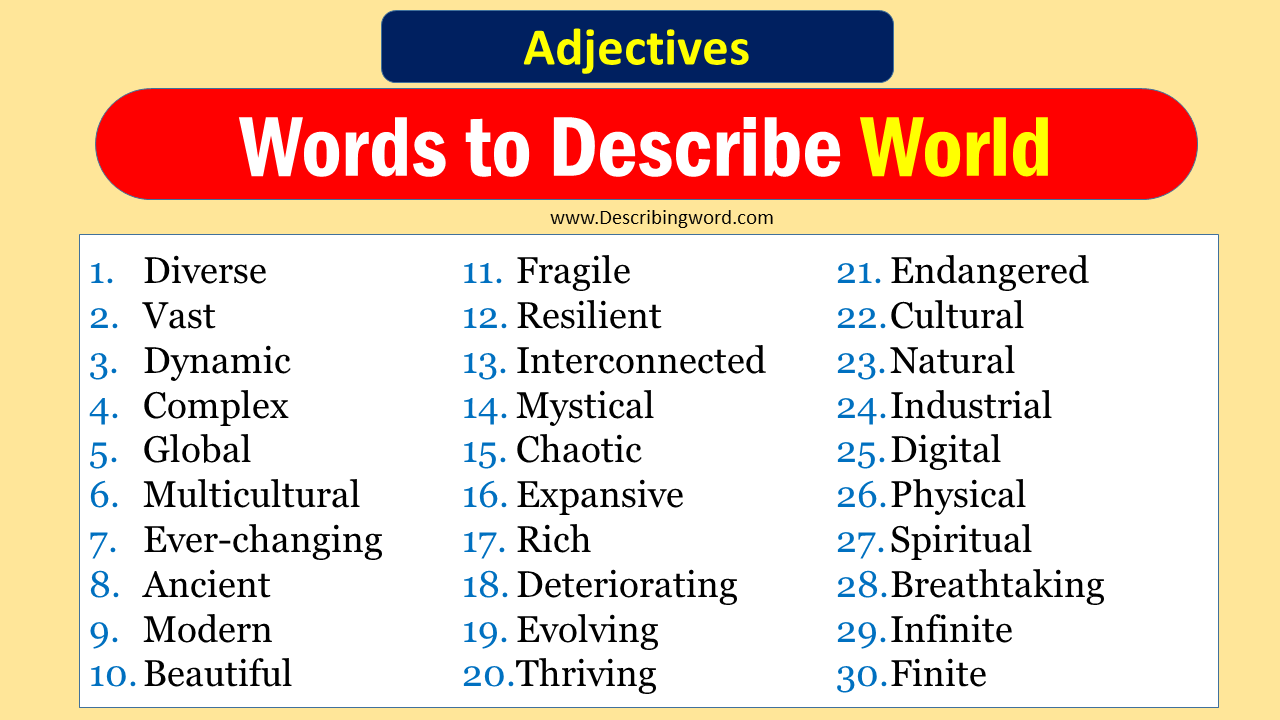World encompasses the entirety of humanity, our planet Earth, and the life upon it. It signifies the sum of all ecosystems, cultures, and experiences.
In this lesson, you will learn a diverse array of words to describe the world, enhancing your ability to depict its vastness, diversity, and the myriad of perspectives one can have about it.
Words to Describe World
Here are the most common words to describe World:
| Diverse | Vast | Dynamic |
| Complex | Global | Multicultural |
| Ever-changing | Ancient | Modern |
| Beautiful | Fragile | Resilient |
| Interconnected | Mystical | Chaotic |
| Expansive | Rich | Deteriorating |
| Evolving | Thriving | Endangered |
| Cultural | Natural | Industrial |
| Digital | Physical | Spiritual |
| Breathtaking | Infinite | Finite |
Adjectives for World
1. Vast
Meaning: Extremely large or immense
Example: The vast world offers countless travel opportunities.
2. Diverse
Meaning: Varied and different
Example: The diverse world hosts many unique cultures.
3. Global
Meaning: Relating to the entire world
Example: Global events can have significant impacts everywhere.
4. Dynamic
Meaning: Full of energy and change
Example: Our dynamic world constantly evolves and changes.
5. Complex
Meaning: Composed of interconnected parts
Example: The complex world requires thoughtful understanding and analysis.
6. Modern
Meaning: Relating to the present time
Example: The modern world relies heavily on technology.
7. Evolving
Meaning: Continuously developing and changing
Example: The evolving world brings new challenges and opportunities.
8. Interconnected
Meaning: Linked or related in many ways
Example: In our interconnected world, events affect us globally.
9. Digital
Meaning: Involving computers and technology
Example: The digital world has transformed how we communicate.
10. Diverse
Meaning: Different in kind or character
Example: The world is diverse in culture and geography.
11. Natural
Meaning: Relating to nature
Example: The natural world needs our urgent protection.
12. Fragile
Meaning: Easily damaged or broken
Example: Our fragile world demands responsible stewardship from everyone.
13. Chaotic
Meaning: Full of confusion and disorder
Example: In a chaotic world, clear vision is vital.
14. Expansive
Meaning: Covering a large area
Example: The expansive world provides ample space to explore.
15. Intricate
Meaning: Very detailed and complex
Example: The intricate world needs careful navigation to understand.
16. Beautiful
Meaning: Pleasing and attractive
Example: The beautiful world amazes travelers with its scenery.
17. Rapid
Meaning: Happening at high speed
Example: The rapid world of today never pauses for anyone.
18. Real
Meaning: Actual and genuine
Example: We live in a real world full of challenges.
19. Unified
Meaning: Brought together as one
Example: A unified world fosters global peace and harmony.
20. Enigmatic
Meaning: Difficult to understand and mysterious
Example: Our enigmatic world still holds many unanswered questions.

Positive Adjectives for World
- Harmonious
- Enlightened
- Sustainable
- Peaceful
- Flourishing
- Bountiful
- Majestic
- Inspiring
- Nurturing
- Vibrant
Negative Adjectives for World
- Polluted
- Overcrowded
- Conflicted
- Exploited
- Divided
- Endangered
- Wasteful
- Corrupted
- Depleted
- Unstable
Other Words for World
Here are other words for World:
- Earth
- Globe
- Planet
- Cosmos
- Universe
- Nature
- Society
- Humanity
- Civilization
- Realm
- Domain
- Environment
- Habitat
- Ecosystem
- Geography
- Continent
- Hemisphere
- Biosphere
- Territory
- Landscape
- Setting
- Sphere
- Domain
- Existence
- Creation
- Dimension
- Province
- Microcosm
- Macrocosm
- Reality
How to Describe World in Writing?
Describing the world in writing involves capturing its enormity, diversity, and the myriad interactions within it. Start by painting a broad picture of the world, touching on its vast landscapes, diverse cultures, and the complex web of life it supports. Use vivid imagery and sensory details to bring to life the sights, sounds, and textures of different environments, from bustling cities to serene natural wonders.
Next, delve into the dynamic aspects of the world—the ever-changing social, technological, and environmental landscapes. Highlight the contrasts between the ancient and the modern, the natural and the man-made, and the peaceful and the chaotic. This juxtaposition can create a rich tapestry that reflects the multifaceted nature of the world.
Finally, reflect on the emotional and philosophical implications of the world’s diversity and complexity. Consider the human experience within this vast setting, exploring themes of connection, isolation, progress, and decline. Discuss how the world shapes and is shaped by the dreams, actions, and interactions of its inhabitants, offering a nuanced perspective that invites readers to ponder their place within the global tapestry.

